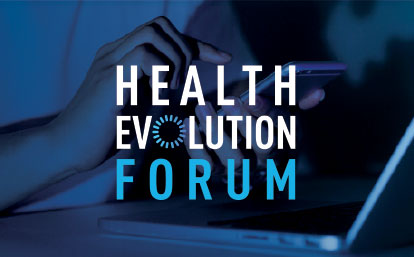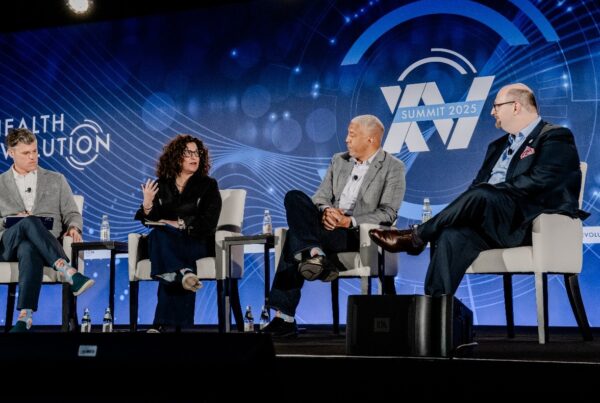Health Evolution is assembling three Work Groups to advance the use of Next Generation IT in Health Care by leveraging the power of technology and data to identify and establish best practices for partnerships between health care organizations and technology innovators for enabling longitudinal patient-centered care that reduces clinician burnout and protects patients’ privacy.
Chief among the reasons health care has thus far not achieved the full potential from IT investments: Data is neither properly used nor enhanced and transformed to answer the questions needed by health care executives and clinicians.
“It’s difficult to be great at digital health,” said Peter Neupert, Lead Director at Adaptive Biotechnologies, and a Roundtable Co-Chair. “This will be the one group that thinks hard about how to unlock data, enable new insights from technology like AI and ML in a way that works for the whole system, including life sciences, payers, patients, and providers. And that, I think, is the core obstacle to being able to do many things.”
Consisting of broad cross-industry membership including CEOs, policymakers, thought leaders and other executives, the Next Generation IT in Health Care Roundtable ratified three key initiatives:
-
- Governance and Use of Patient Data in Health IT Products
- Digital Health and App Experience
“Meaningful transformation of data and availability for feeding it in useful forms to patients and clinicians is a tremendously important focus — and has been one of the greatest barriers,” said Molly Coye, MD, Executive in Residence, AVIA, and a Forum Senior Fellow. “That change will really move us forward.”
Why IT Matters
Developing and disseminating guidelines and best practices for partnerships between providers, payers and innovative technology companies to harness data will improve care access, decrease clinician burnout, reduce costs, and bolster outcomes.
“If we improve care through better use of IT, spending will come down,” said Steve Udvarhelyi, MD, President & CEO, Blue Cross and Blue Shield of Louisiana, and a Roundtable Co-Chair. “The key to this Work Group is that most health policy has concentrated on how we pay for our fragmented, expensive, inequitable system, as opposed to how we actually transform the system. This work will provide the Quadruple Aim of better care, better access, better quality at a lower cost and a better user experience.”
Learn more about Health Evolution Forum’s Next Generation IT in Health Care Work Groups
Digital health and the myriad ancillary IT apps, devices and software programs that it encompasses, however, are essentially layered on top of the health care system, rather than integrated into day-to-day operations and functions. And while nothing resembling an ideal approach for integrating EHRs or patient monitoring into models of care exists, to cite just two examples, current circumstance suggest major investments in those areas are imminent.
“We know that health plans are going to spend upwards of a billion dollars to comply with CMS interoperability rules. They’re going to be upgrading their systems, but also tapping into a growing network of provider APIs that are similarly undergoing an overhaul as they begin to automate much of the massive COVID-related data reporting efforts,” said Aneesh Chopra, President, CareJourney, and a Roundtable Co-Chair. “And then we saw in the CARES Act billions of dollars modernizing the public health system including a portion for the purposes of ingesting EHR records.”
The possible impact of that funding and what appears to be becoming widespread innovation — against the backdrop of a fragmented health care system, particularly relative to technology and data — sets the stage for driving real change to the betterment of America.
Here is a brief explanation of each Work Group.
Governance and Use of Patient Data in Health IT Products. Along with the grand expectations for using patient data, payer, provider and life sciences companies face potential public backlash and regulatory scrutiny when engaging outside partners to analyze PHI and non-PHI information, and when using patient data in new ways that may exacerbate health disparities and pose ethical challenges. While the FDA regulates AI tools used in diagnosis or treatment, the lack of guidelines for how AI should be developed puts organizations at risk. This Work Group will advocate for responsible innovation to guide the product development process and shape partnerships between health care organizations and developers of AI and other analytics.
Digital Health and App Experience. With the hundreds of thousands of health apps available, health systems and plans do not have reliable methods for knowing which apps their consumers are using or whether those apps are appropriate based on an individual’s health status. At the same time, the digital strategies of health plans and systems tend to be fragmented. This Work Group will identify best practices for patient/member app and digital health experience to enable more accessible and coordinated care.
The Work Groups will circulate draft and final best practices to payer, provider and life sciences CEOs, boards, regulators, developers and other relevant people and organizations.
“Digital health automation and responsible use of clinical data are the things we know have the highest likelihood of a near term impact on value in health care spending and also readiness for secure clinical information exchange,” said Amy Abernethy, MD, PhD, Principal Deputy Commissioner, FDA.
Directionally Correct Change Management
The Next Generation IT in Health Care Work Group’s focus will be to arrange various puzzle pieces with technology and data together into a cohesive picture.
Health Evolution Work Groups are chartered by Roundtables, which are part of the Health Evolution Forum, a peer-to-peer collaboration launched in July to drive real change — including associated initiatives such as New Models of Care Delivery and Community Health and Advancing Health Equity.
Health Evolution develops Work Groups to address new models of care delivery
The Roundtable’s charter strives for a more advanced level of IT deployment, including digital health, interoperability, new forms of data, integrated clinical trials and AI/ML, which can drive better and more equitable patient outcomes through modernization and implementation of consumer engagement, population health and care delivery.
Health Evolution Forum Interim Executive Director Brad Fluegel explained that the Work Groups are focused on initiatives where cross-industry collaboration can drive change in three years, not work that will take 10 or 20 to realize. Efforts that the Next Generation IT in Health Care and other working groups undertake need to be held up as work that participating CEOs would not only advocate to their peers but also commit to doing in their organizations, added Health Evolution Founder and Executive Chairman David Brailer, MD.
“Things in health care are going to change at a level that we have never experienced before,” said Steve Klasko, MD, President & CEO, Thomas Jefferson University and Jefferson Health, and a Roundtable Co-Chair. “The question is: Can we, as a group of leaders within health care, make sure that change is heading in the right direction? That’s why this is so important.”











